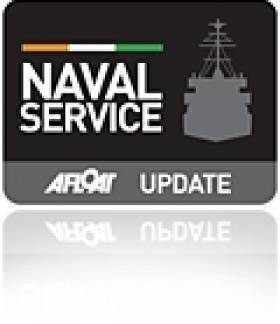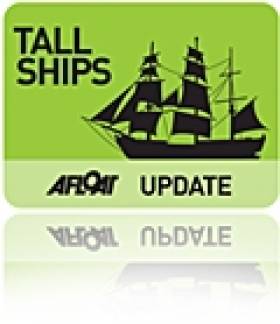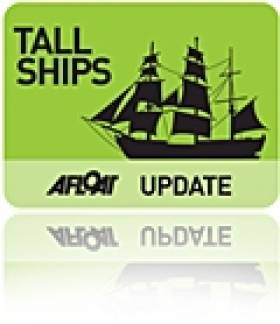Displaying items by tag: Kathleen and May
#NavalService- L.É. Ciara (P42) recently made a surprise visit to Youghal, from where the coastal patrol vessel (CPV) was carrying out navigation exercises at the harbour mouth.
On board was Officer Commanding Lt Cdr Brian Sweeney with a crew of 40 approx. Locals and tourists saw the CPV from the vantage points along the quayside.
Among the onlookers were the proud parents of Chief Petty Officer Michael ( Rocky) Cashell from Youghal who was at the wheel of the LÉ Ciara as she steamed up the river Blackwater.
To watch a video of the L.É. Ciara during her brief visit and to read more YoughalOnLine has a report
The small port engages in the export of timber products which are served by coasters.
As previously reported on Afloat.ie, the sale-listed 113 year-old 'Kathleen and May' a historic West Country schooner, made frequent calls to the port town up to the 1960's.
On these calls she would be typically laden with coal having made passage from Bristol.
Historic Coal Ship Could Be Sold To Asia
#TallShips - A tall ship that once plied the route between Bristol and Youghal may be sold to Asia unless funding can be secured to keep it at its current home in Liverpool.
The Daily Mail reports on the 113-year-old schooner Kathleen and May, which has been berthed since 2010 at Liverpool's Hartley Quay where it is cared for by a team of 60 volunteers with support from the UK's Arts Council.
Previously she made heritage visits to Dublin in 2008 and 2009 carrying a cargo of French wine, the first commercial voyages for the vessel since the 1960s.
The ship is the last traditional (West Country) wooden topsail schooner and was built at Deeside. She is also listed on the National Historic Ships Register.
Kathleen and May is priced at £2 million (€2.36 million) and has been on the market since last year.
Now an offer for the former coal ship has come in from a Far East Asian buyer - and concerns are growing that she could leave the British Isles for a new life half-way round the world.
The Daily Mail has more on the story HERE.
Surviving West Country Schooner Evokes Days of Irish Sea Sail Cargo Trade
Bessie Ellen is rigged with eight sails which cover 330 sq m and this would be the only source of power to transport her hold which had a cargo capacity for 150 tons. Her original owner was the North Devon home-skipper Captain John Chichester who named the ketch after two of his daughters. The crew would be limited to between four to six persons, a captain, mate, deckhands and cook.
By the Second World War most of these numerous working cargo sailing ships were being taken over by power-driven vessels. They were becoming increasingly redundant and laid-up rotting away in creeks, fortunately there was sufficient cargo for Bessie Ellen up to 1947.
She was purchased by Danish owners for where she carried a profitable trade in scrap metal, even so sail-power was not enough and she had an engine installed. Trade increased and she was too small to serve her owners Capt. Moller up to the 1970's. In 1983 there were plans to convert the vessel for charter but this fell-through.
Her current owner Nikki Alford brought the vessel in 2000 and over the next three years she was refitted to original rigging specifications and re-emerged in her new career as a sail training vessel. She runs day-long sailing cruises and longer sailing expeditions and educational programmes. Accommodation is for 20 persons in bunks and another 12 is set aside for guests.To read more about the ketch click HERE.
In recent years another West Country traditional sailing vessel the staysail-schooner Kathleen and May made an historic voyage to Dublin in 2008 with a commercial cargo of French wine. This would be the first cargo she conveyed since 1961, also the last year in which the last Arklow owned cargo-carrying schooner the De Wadden would trade, though she was fitted with an engine. The schooner is now preserved in Liverpool, click this LINK.
Katheleen and May made a second delivery to Dublin in 2009 again for Fair Wind Wine and the company (CTMV) also chartered the schooner Etoile de France in advance of St. Patrick's Day. The final CTMV wine cargoes were on board the Bessie Ellen and Notre Dame de Romengol during the last Dublin Docklands Maritime Festival held in 2010. The small French coastal cargo vessel or "gabare" built in 1945 at Camaret, near Brest is classified by the French government as an historic monument.
Also last year the oldest sailing tallship in Europe, the French barque Belem attended the inaugural Hoist the French Sail, French Week in Dublin. The 1896 built Belem was specially chartered in to celebrate the 50th anniversary of Alliance Francaise in Dublin.
Several years ago Belem called to the capital to deliver wine but this was a trade-only publicity exercise prior to the CTMV wine cargoes. Apart from wine she is also associated with Sir Arthur Ernest Guinness of the family brewing dynasty, who owned her as a private 'yacht' under the name of Fantôme II. To read more about the fascinating history of this barque click HERE.
- Dublin Bay
- Dublin Port
- Dublin Docklands Maritime Festival
- Tall Ships
- Fair Wind Wine
- Belem
- Dun Laoghaire Harbour News
- Fantome II
- East Coast skiffs
- Hobblers Challenge
- Rowing news
- St. Michaels Rowing Club
- Irish Sea schooners
- Hoist the Flag French Week Festival
- CTMV
- Bessie Ellen
- West Country ketch
- West Country gaffschooner
- Kathleen and May
- Irish Sea sailing cargo
- Sir Arthur Guinness
- Guinness yachts
- Barque Belem
- Belem Fondation
- Dublin Bay Hobblers


























































